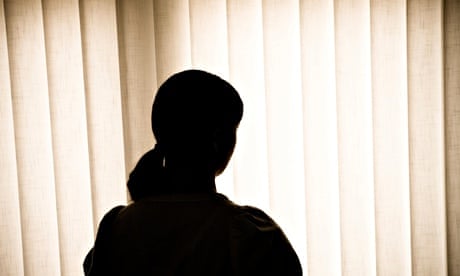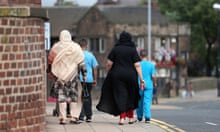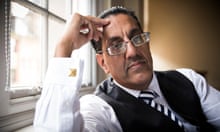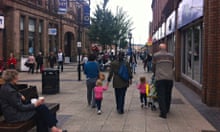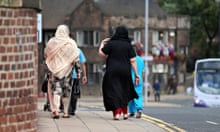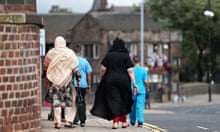It was an overcast October day during the half-term school holiday and I was 11 years old. I found myself sitting alone, on a plastic chair, in the empty bedroom of a terraced house. Behind me was a large, one-way mirror, in front of me a video camera on a stand. There was a small box of broken toys in the corner.
I'd been taken there in the back of a police car and told to wait until the officers were "ready for me". I wasn't sure if I was being filmed or watched secretly. I wasn't sure of anything, except that I was scared stiff. So I tried to avert my eyes from the blinking red light on the camera and sat frozen and silent, staring intently at the book in my hands. I didn't read a single word.
Some time later, I was led downstairs and told that I had been brought to the police house to be questioned about allegations of sexual abuse. I could hardly breathe. The officers offered me a rich tea biscuit. I'm not sure how long I was questioned. An hour perhaps, maybe two. We sat at a dining table, while questions were asked and I gave quiet, monosyllabic replies – when I could. But some of the questions I found especially difficult to answer.
"What were you wearing that night?" asked one of the officers. "Um, a nightie?" I mumbled, confused by the question. "Yes, but what sort of nightie?" she continued. "Er, I don't know, just an ordinary nightie," I offered apologetically, still not understanding. The officer pressed me harder: "How short was it, though?"
And then the penny dropped. As I indicated a point halfway up my thigh and swallowed back tears, I realised that I must have done something wrong when I – 11 years old, let's not forget – was sexually assaulted by this 32-year-old man. Done something wrong by wearing a short night-dress.
As I felt myself flooded with feelings of shame and guilt, the questions went on. Had I touched him? Where did I touch him? How did I touch him? For years afterwards, those questions echoed in my head, followed by a relentless, inner voice of my own that said: "You must be a dirty little whore".
I was reminded of it again last week when I read about the horrifying abuse and exploitation suffered by 1,400 girls in Rotherham. Many of those girls came into contact with the police, but very few of them were treated as victims who needed support.
Some never got any attention from agencies at all and, according to Alexis Jay's report, they were seen as "undesirables" and "slappers" who were best left alone.
There's been public outrage over the systematic failure of protection and rightly so. I was angered too. But I wasn't particularly shocked – and not only because I'd experienced first hand how abuse victims can be treated. Now, just in my thirties, I still see this kind of failure all the time, from another perspective. Knowing the harm sexual violence can do to people's lives – and how much difference it makes to get the right support – I ended up working for an organisation that supports those who've been through abuse and exploitation.
We deal with teenagers who've been exploited, raped and subjected to gang violence. Some have fallen prey to gangs of Asian men, as in Rotherham, but elsewhere the perpetrators have been white men, black men or mixed gangs.
What the victims often have in common is that they were either not believed or they were ignored or, worse still, blamed. We have had 13-year-old rape victims described by police as "promiscuous", 14-year-olds called "slags" and countless others who won't speak to the police at all because they are too scared and ashamed. For girls who have already suffered abuse, this victim blaming or, in some cases, total denial and disbelief, serves to crush further what little is left of their sense of self-worth.
I've spent years trying to understand where these attitudes come from. Why are some victims seen as unworthy of help? Why is the label "streetwise" applied to them as if it's an excuse for doing nothing? Is it because many are from rough council estates? Is it because they often come from troubled backgrounds and have already been written off? Is it cultural? Class prejudice? Is it straightforward sexism?
I do understand that it's difficult for police to handle sexual abuse, exploitation and rape. Very often, the victims can't or won't give evidence; they have sometimes got caught up in criminality themselves and frequently show misplaced loyalty to their abuser. For many victims, it's a long time before they can see that what is happening to them is wrong and they don't have to endure it.
When I was questioned by police, they focused on one event, but never asked me about any of the other incidents of abuse I'd experienced over the years. And I didn't mention them either. I'd been well trained to keep "our little secret", to play things down and twist the truth.
That's what the psychological grooming process does to you. It's part of the damage abuse does and I've no doubt it does make it harder to elicit "reliable evidence" from a "reliable witness" in the usual way, whether they're pre-pubescents, as I was, or older teens.
That's why it's so crucial that agencies dealing with those who've been groomed are properly trained to understand it. Police, judges or council budget managers… if they don't get it they'll never stop it happening.
To be fair to front-line workers in Rotherham, they did try to get senior managers to take action. But those senior managers never did. Somewhere along the line, in juggling budgets and priorities they made a compromise – and they compromised on child rape.
That decision to take no proper action in Rotherham wasn't just heartless, it was a false economy. I've no doubt that, like me, those victims will struggle with the consequences for years, at great human cost to themselves, and financial cost to the taxpayer. For me, it was depression and PTSD that I battled – with help from the NHS. For countless others, it's alcoholism, drugs, serious mental illness, abusive relationships and costly disruptions to their education and employment.
It costs money to stop abuse and exploitation and it costs money to support survivors to recover. But if we want a society that values and protects children and teenagers from all backgrounds, it's money we can't afford not to spend.
I was one of the lucky ones. After a few false starts with an idiotic counsellor ("How much do you like boys? Would you say you liked boys too much?"), eventually I got decent support and recovered from the trauma of abuse. In the end, I was able to understand it wasn't my fault. Many years later, I no longer feel ashamed.
